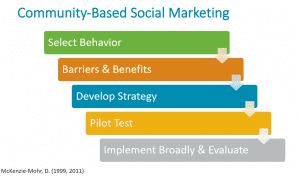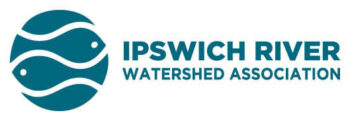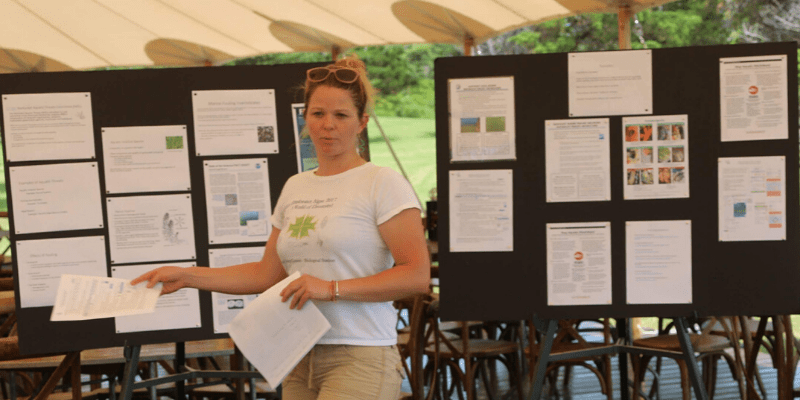Ipswich River Science and Restoration Manager Kaitlyn Shaw (above) has learned that presenting the facts is not enough, you have to change behavior.
According to social scientists and psychologists, changing behavior takes much more than information and educational campaigns alone. With that in mind, I’d like to discuss barriers. Not dams and road stream crossings, but barriers to behavioral change.
Before I started with the Ipswich River Watershed Association, I worked as a Water Resource Specialist. During this time, I learned a lot about what doesn’t work when it comes to influencing behavior changes to protect water quality. Early on, I was invited to present about water quality at a town hall meeting and spent hours creating what I thought to be very clear bar charts indicating the levels of nutrients at different sites around the town compared with the levels we were aiming for to protect environmental health. Soon after I had begun, I noticed members dozing off. Oh-no, I was losing their attention!
I’ve spent more hours than I’d like to admit creating diagrams, infographics, speedometer charts and pamphlets in an effort to encourage behavior changes. You name it, I tried it! I took my message on the road with the Civic League in an effort to “institute a cultural shift,” hosted meetings in people’s living rooms to try to reach different audiences and failed miserably at a slam poetry event aimed at nutrient enrichment. I thought if I showed people where we were and where we needed to be, people would respond by changing behaviors (e.g. pick up dog waste, reduce fertilizer use, inspect septic systems, plant vegetated buffers, and improve wastewater treatment). Unfortunately, it was all a little too complicated to be effective, people didn’t necessarily need a biology or chemistry lesson. With that being said, there were people who did change their behaviors and ask questions to ensure they were not part of the problem.
 It was not until later that I learned through the principles described by psychologist Doug McKenzie-Mohr that educational materials tend to fall short of achieving goals because “there is often little or no relationship between attitudes and/or knowledge, and behavior.” Similarly, finance-based incentives assume people evaluate choices then “act in accordance with their economic self-interest” however this, “does not consider complex cultural practices, social interactions, and human feelings that influence the behavior of individuals, social groups, and institutions”.
It was not until later that I learned through the principles described by psychologist Doug McKenzie-Mohr that educational materials tend to fall short of achieving goals because “there is often little or no relationship between attitudes and/or knowledge, and behavior.” Similarly, finance-based incentives assume people evaluate choices then “act in accordance with their economic self-interest” however this, “does not consider complex cultural practices, social interactions, and human feelings that influence the behavior of individuals, social groups, and institutions”.
We know there is a lot of pollution entering our streams, rivers, ponds and harbors. These contaminants, all of which are generated through human behaviors lead to conditions that are not ideal for the health of the river and all the life that depends upon it including ourselves. The good thing is there is something we can all do about it right now. There are behaviors that we conduct that could be changed to better protect the health of the river and our communities.
As the name implies, Community Based Social Marketing (CBSM) is community based and focused on community-wide behaviors that can collectively lead to positive environmental or social changes. The principle is derived from social science and follows that in order to adopt a new behavior, the barriers to engaging in that behavior must be lowered and the benefits must be clear. After the barriers and benefits are understood, a strategy can be developed to lower barriers and make adopting the behavior easier. Finally, the strategy is applied to a pilot community before being refined and implemented more broadly through multiple communities. Currently, we are participating in an innovative pilot program with the Massachusetts Division of Ecological Restoration (DER), and consultants from Eastern Research Group (ERG) and Action Research. We have brainstormed a list of behaviors to target as part of this project. Now we’d like your input! Please leave a comment below with a behavior that you think impacts water quality the most in your community!
- McKenzie-Mohr, Doug. Fostering Sustainable Behavior: an Introduction to Community-Based Social Marketing. Gabriola Island, BC: New Society Publishers, 1999.

